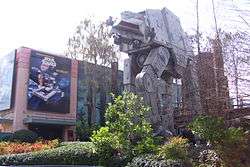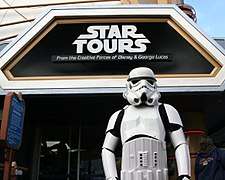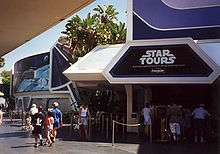Star Tours
| Star Tours | |
|---|---|
 | |
 | |
| Disneyland | |
| Area | Tomorrowland |
| Coordinates | 33°48′42″N 117°55′04″W / 33.8118°N 117.9177°W |
| Status | Closed |
| Soft opening date | December 1986 |
| Opening date | January 9, 1987 |
| Closing date | July 27, 2010 |
| Replaced | Adventure Thru Inner Space |
| Replaced by | Star Tours - The Adventures Continue |
| Tokyo Disneyland | |
| Area | Tomorrowland |
| Coordinates | 35°38′00″N 139°52′42″E / 35.6334°N 139.8783°E |
| Status | Closed |
| Opening date | July 12, 1989 |
| Closing date | April 2, 2012 |
| Replaced by | Star Tours - The Adventures Continue |
| Disney's Hollywood Studios | |
| Area | Echo Lake |
| Coordinates | 35°38′00″N 139°52′42″E / 35.6334°N 139.8783°E |
| Status | Closed |
| Opening date | December 15, 1989 |
| Closing date | September 7, 2010 |
| Replaced by | Star Tours - The Adventures Continue |
| Disneyland Park (Paris) | |
| Area | Discoveryland |
| Coordinates | 48°52′30″N 2°46′46″E / 48.8751°N 2.7794°E |
| Status | Closed |
| Opening date | April 12, 1992 |
| Closing date | March 16, 2016 |
| Replaced by | Star Tours - The Adventures Continue |
| General statistics | |
| Attraction type | Flight simulator with Audio-Animatronics synced to film |
| Manufacturer | Rediffusion Simulation |
| Designer | Walt Disney Imagineering |
| Music | Richard Bellis[1] |
| Vehicles | 4-6 |
| Riders per vehicle | 40 |
| Participants per group | 40 |
| Duration | 4:30 |
| Height restriction | 40 in (102 cm) |
| Audio-animatronics | Yes |
| Host | Captain Rex (Paul Reubens) |
|
| |
|
| |
Star Tours was a motion simulator attraction at several Disney theme parks, based on the successful Star Wars film series created by George Lucas. Set in the Star Wars universe, the attraction sent guests on an excursion trip to Endor, whilst being caught in an altercation between the Rebel Alliance and the Galactic Empire. The attraction featured Captain "Rex" RX-24 along with series regulars R2-D2 and C-3PO.
At its debut at Disneyland in 1987, it was the first attraction based originally on a non-Disney licensed intellectual property. The first incarnation of the ride appeared in Tomorrowland at Disneyland in 1987, replacing the previous attraction, Adventure Thru Inner Space. The attraction had subsequent openings at Tokyo Disneyland, Disney's Hollywood Studios, and Disneyland Paris.
The attraction at Disneyland and Disney's Hollywood Studios closed in 2010 to allow conversion for its successor attraction, Star Tours – The Adventures Continue.[2] The latter location was completed on May 20, 2011. Tokyo Disneyland and Disneyland Paris closed their versions for conversion in 2012 and 2016,[3] marking the original ride's final run of 29 years.[4]
History

The ride that became Star Tours first saw light as a proposal for an attraction based on the 1979 Disney live-action film The Black Hole. It would have been an interactive ride-simulator attraction where guests would have had the ability to choose the route. However, after preliminary planning the Black Hole attraction was shelved due to its enormous cost—approximately $50 million USD—as well as the unpopularity of the film itself.
Instead of completely dismissing the idea of a simulator, the company decided to make use of a partnership between Disney and George Lucas, the creator of Star Wars, that began in 1986 with the opening of Captain EO (a 3-D musical film starring Michael Jackson) at the California park. Disney then approached Lucas with the idea for Star Tours. With Lucas' approval, Disney Imagineers purchased four military-grade flight simulators at a cost of $500,000 each and designed the ride structure.
Meanwhile, Lucas and his team of special effects technicians at Industrial Light & Magic produced the first-person perspective film that would be projected inside the simulators. When both simulator and film were completed, a programmer then sat inside and used a joystick to synchronize the movement of the simulator with the apparent movement on screen. On January 9, 1987, at a final cost of $32 million, almost twice the cost of building the entire park in 1955, the ride opened to throngs of patrons, many of whom dressed up as Star Wars characters for the occasion. In celebration, Disneyland remained open for a 60-hour marathon from January 9 at 10 a.m. to January 11 at 10 p.m.
Closing
On August 14, 2010, Walt Disney World hosted the "Last Tour To Endor" event exclusively for Celebration V attendees at Disney's Hollywood Studios from 8pm to 1am. Entertainment features and events at "Last Tour To Endor" included George Lucas, character appearances, Jedi Training Academy, Death Star Disco, Bespin Stage Dance Party, Raiders Of The Lost Jedi Temple of Doom: A Fan Film of Epic Proportions live show, Hyperspace Hoopla, Symphony in the Stars fireworks, and the Star Tours shutdown ceremony. The Star Tours shutdown ceremony was a live show with characters C-3PO, R2-D2, Boba Fett, Darth Vader and a few Stormtroopers, culminating in the official power-down of the original Disney World Star Tours attraction. However, instead of R2-D2 simply shutting it down, Boba Fett destroyed the ride's power supply using a thermal detonator (achieved using pyrotechnics). The ride was still open after the shutdown ceremony until September 7, 2010, when the attraction held its "Final Flight to Endor" exclusive to D23 members.
Attraction

Advertised as "The Ultimate Star Wars Adventure!", Star Tours put the guest in the role of a space tourist en route to the forest moon of Endor, the site of the climactic battle of Return of the Jedi, via the Star Tours travel agency. Much was made of this throughout the ride queue, which was designed to look like a spaceship boarding terminal: posters advertised voyages to different planets, and a giant screen informed riders of the benefits of going to Endor. This area was stocked with Audio-Animatronic characters that seemed to speak to the ride patrons (including C-3PO and R2-D2), as well as a life-size mock-up of a StarSpeeder 3000, the fictional spacecraft which riders were about to board. According to the book Disneyland Detective by Kendra Trahan, the figures of C-3PO and R2-D2 in the Disneyland attraction were actual props from the original film, modified to operate via Audio-Animatronics.
Guests then entered a maintenance area where an apparently underproductive G2 droid performed repairs on another droid while being distracted by the observing guests, and another droid inadvertently pointed out all the supposed flaws of the StarSpeeder 3000 and its RX pilots. The G2 droids were in fact the animatronic skeletons of two geese from the Tomorrowland attraction America Sings. A ride attendant escorted guests to one of several loading stations where they waited for their turn to ride.
A television screen above the queue displayed a countdown to take-off time and showed images of the Starspeeder 3000 spacecraft being serviced. As launch time approached, a safety video was shown featuring Star Wars aliens, Disney Imagineers, and their families. It instructed guests how to fasten their seat belts and where to place belongings. Once the doors to the Starspeeder opened, guests walked across bridges into one of several Starspeeder cabins. As the doors closed, the bumbling pilot droid of the ship, RX-24 or Rex (voiced by Paul Reubens), appeared on the side screen and chatted to the guests about the trip as R2-D2 was loaded onto the spacecraft.
Rex lowered the cockpit shield, and the hangar crew activated the flight platform. All went well until a slight mistake on Captain Rex's part sent the Starspeeder crashing into the maintenance bay doors and plummeting into the maintenance yard. They just barely crashed into the control room and nearly collided with a giant mechanical arm. Once in space, Rex asked R2-D2 to make the jump to lightspeed. However, the ship accidentally passed the Endor moon and instead got caught inside a comet cluster. The ship got hit by several comets before getting trapped in one of the larger comets. The Starspeeder weaved its way through the comet and escaped by crashing through one of the walls. Upon escaping the comet, however, the ship encountered a Star Destroyer of the Imperial Remnant.
The Starspeeder got caught in its tractor beam, but managed to get loose when a New Republic X-wing fighter provided assistance by destroying the tractor beam's generator. Soon the Starspeeder accompanied the Republic fleet on an assault on the Death Star III (later revealed by Leland Chee in 2013 to be a Habitation Sphere disguised as a Death Star in a plot by an Imperial Warlord to distract the New Republic). Rex used the Starspeeder's lasers to eliminate several TIE fighters while a Republic pilot destroyed the Death Star in the same manner as Luke Skywalker by firing two proton torpedoes into the exhaust port. The X-Wings jumped to lightspeed as the Death Star exploded, and a final lightspeed jump sent the Starspeeder back to the spaceport, nearly colliding with a fuel truck in the hangar and sending a Star Tours employee ducking under his desk. As the cockpit shield raised and cut off Rex as he apologized for the near-fatal flight, C-3PO instructed the passengers on the exit procedure and thanked them, oblivious to the perils they just faced. The exit doors opposite the entrance then opened and the passengers proceeded across another set of bridges into the exit hall towards the Star Trader gift shop.
Cast
English
- Anthony Daniels - C-3PO (voice and action)
- Paul Reubens - Captain RX-24, a.k.a. Rex (voice)[5]
- Brian Cummings - Vid-Screen Announcer (planetary destinations) (voice)
- Stephanie Taylor - Safety Instructor
- Steve Gawley - cameo as Red Leader (onboard video)
- Warwick Davis - cameo as Wicket the Ewok
Japanese dub
Yūji Mitsuya – Captain RX-24, a.k.a. Rex (voice)
French dub
- Anthony Daniels – C-3PO
- Luq Hamet – Captain RX-24, a.k.a. Rex (voice)
Muren, Gawley, and Keeler were all Industrial Light & Magic special effects staff. One year earlier, Reubens had voiced the shipboard computer in the Disney film Flight of the Navigator (credited as Paul Mall), in which his character was named Max. Reubens credited this role with his being cast for the ride.[5]
Ride system
Star Tours utilized hydraulic motion base cabins featuring six degrees of freedom, including the ability to move 35 degrees in the X-Y-Z plane. The simulator was patented as Advanced Technology Leisure Application Simulator (ATLAS), originally designed by Rediffusion Simulation[6] in Sussex, England, now owned by Thales Training & Simulation (ex-Thomson-CSF). The Rediffusion 'Leisure' simulator was originally developed for a much simpler show in Canada called "Tour of the Universe", where it featured a single entrance/exit door in the rear of the cabin and a video projector. The film was front-projected onto the screen from a 70 mm film projector located beneath the cockpit barrier. The Disneyland original had four simulators, while the shows in Tokyo Disneyland, Disneyland Paris, and WDW Disney's Hollywood Studio each had six motion bases.
Successor
The successor attraction opened in Disney's Hollywood Studios on May 20, 2011 and at Disneyland on June 3, 2011, replacing the parks' original Star Tours attractions. It features an updated ride system, consisting of a new high-definition video, a Dolby 3D high-definition screen, improved motion simulators and several new special effects and Audio-animatronics.
The attraction is set at an earlier point in the Star Wars timeline[7] (between Revenge of the Sith and A New Hope) and is piloted by C-3PO.[8]
Gallery
 An Audio-animatronic Mon Calamari can be seen in the control booth
An Audio-animatronic Mon Calamari can be seen in the control booth Queue showing Star Speeder.
Queue showing Star Speeder. Loading Area
Loading Area Mike Johansen of the 501st Legion dressed as a stormtrooper in front of the attraction while participating in the CHOC Walk, a Walk-A-Thon for Children's Hospital of Orange County
Mike Johansen of the 501st Legion dressed as a stormtrooper in front of the attraction while participating in the CHOC Walk, a Walk-A-Thon for Children's Hospital of Orange County Disney's Hollywood Studios' entrance
Disney's Hollywood Studios' entrance Disneyland's entrance in 1998 after the Tomorrowland makeover
Disneyland's entrance in 1998 after the Tomorrowland makeover Disneyland's entrance in 1996 before Tomorrowland makeover
Disneyland's entrance in 1996 before Tomorrowland makeover Tokyo Disneyland's entrance
Tokyo Disneyland's entrance
See also
References
- ↑ "Music by Richard Bellis". Retrieved 24 May 2013.
- ↑ HOW THE 501ST AND REBEL LEGIONS BECAME PART OF STAR TOURS
- ↑ "Star Tours to be Reintroduced in a New Version! - Star Tours: The Adventures Continue - Opening Spring 2013" (PDF). Press Release. Tokyo Disney Resort. November 16, 2011. Archived from the original (PDF) on November 25, 2011. Retrieved November 19, 2011.
- ↑ DreamDisney (7 October 2014). "Star Tours 2 à Disneyland Paris pour les 25 ans". Radio Disney Club.
- 1 2 "Star Tours with Paul Reubens". Interview. D23 The Official Disney Fan Club. August 9, 2011. Retrieved September 19, 2012.
- ↑ Peltz, James F. (November 25, 1993). "Hughes Agrees to Sell Flight Simulator Unit". Retrieved August 24, 2014.
- ↑ Trujillo, Dara (2010-07-30). "Sneak Preview: Starspeeder 1000 Collectible Exclusively at Star Wars Celebration V". Disney Parks Blog. Retrieved 2010-09-25.
- ↑ Fitzgerald, Tom (2010-10-26). "Who's Flying This Thing!?". Disney Parks Blog. Retrieved 2010-10-26.